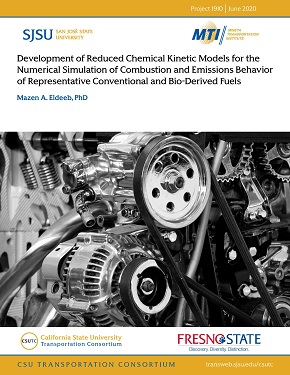- 408-924-7560
- mineta-institute@sjsu.edu
- Donate
Development of Reduced Chemical Kinetic Models for the Numerical Simulation of Combustion and Emissions Behavior of Representative Conventional and Bio-derived Fuels
The study addresses two of the main challenges facing combustion modeling for transportation fuels: simultaneous simulation of non-related combustion problems and reducing the computational cost of the modeling process itself. To address the first challenge, researchers determine a characteristic flame time from thermal diffusivity and laminar burning velocity. Researchers examine parametric dependence of flame time and ignition delay time on pressure, temperature and equivalence ratio for methane, based on validated chemical kinetic mechanisms. The study reveals flame time and ignition delay time show similar temperature dependence, flame time has stronger dependence on equivalence ratio and weaker dependence on pressure than ignition delay time. The study also establishes a correlation to predict flame time, and subsequently, burning velocity, based on knowledge of the relevant auto ignition time. Differences between methane, propane and ethanol are also explored.
Researchers address the second challenge in a chemical kinetic modeling study of the high-temperature ignition behavior of Tetrahydrofuran (THF), a promising second-generation transportation biofuel. The study implements a Stochastic Species Elimination (SSE) reduction approach to develop multiple skeletal versions of a detailed chemical kinetic model of THF from the literature based on ignition delay time simulations at various pressures and temperatures. The developed skeletal versions are combined into a global skeletal model. The study uses ignition delay time simulations using detailed and skeletal models, with good agreement observed at higher temperatures. Next, researchers use sensitivity analysis to identify the most important reactions responsible for the performance of the skeletal model. Finally, they perform reaction rate parameter modification for such reactions in order to improve the agreement of detailed and reduced model predictions with literature experimental ignition data.
This work contributes toward improved understanding and modeling of the oxidation kinetics of conventional and bio-derived transportation biofuels, as well as the estimation of laminar burning velocity that can be encountered in turbulent combustion simulations. This would ultimately contribute into the design of cleaner and more efficient transportation systems, and support the testing and adoption of novel fuels as additives and/or replacement to conventional non-renewable fossil fuels.
MAZEN A. ELDEEB, PhD
Dr. Mazen A. Eldeeb, born in 1987 in Giza, Egypt, is an Assistant Professor of Mechanical Engineering in California State University, Fresno, USA. He received an MS degree in mechanical engineering from Cairo University in 2010 and a PhD in mechanical engineering from Syracuse University in 2015. In January 2016 he joined the Department of Mechanical Engineering, California State University, Fresno, as an assistant professor. His research expertise includes experimental characterization of the auto-ignition behavior of pure second-generation biofuels and their blends with gasoline surrogates through shock tube ignition delay time measurements, as well as chemical kinetic modeling and model reduction. His most recent work includes the development of a chemical kinetic model reduction method, Stochastic Species Elimination (SSE), and the preliminary proposal of another model reduction method, Species Propensity (SP). Dr. Eldeeb’s past work includes several numerical simulation efforts and reaction pathway explorations of the combustion of various fuels including 2,5-dimethylfuran and its blends with iso-octane, 2-methylfuran, 2-methyltetrahydrofuran, and 2,5-dimethylcyclohexane. His work also includes the development of a novel chemical kinetic model for combustion simulations of 2,5-dimethylfuran blends with a gasoline surrogate from the individual models of both pure fuels, through reduction, rate constant modification, and combination. Recently, Dr. Eldeeb co-authored a major journal review article about the recent developments in the production, combustion characterization, and modeling efforts of furan-based fuels.
-
Contact Us
San José State University One Washington Square, San Jose, CA 95192 Phone: 408-924-7560 Email: mineta-institute@sjsu.edu






